外研高一必修1 Module 2 My New Teachers 模块复习课件(71张)
文档属性
| 名称 | 外研高一必修1 Module 2 My New Teachers 模块复习课件(71张) | 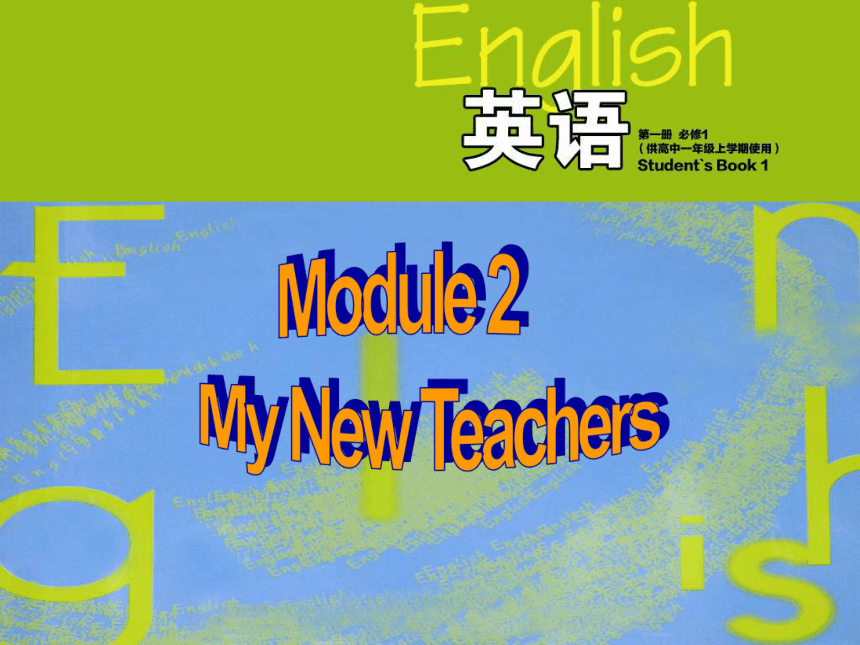 | |
| 格式 | zip | ||
| 文件大小 | 304.6KB | ||
| 资源类型 | 教案 | ||
| 版本资源 | 外研版 | ||
| 科目 | 英语 | ||
| 更新时间 | 2017-01-18 19:50:08 | ||
图片预览

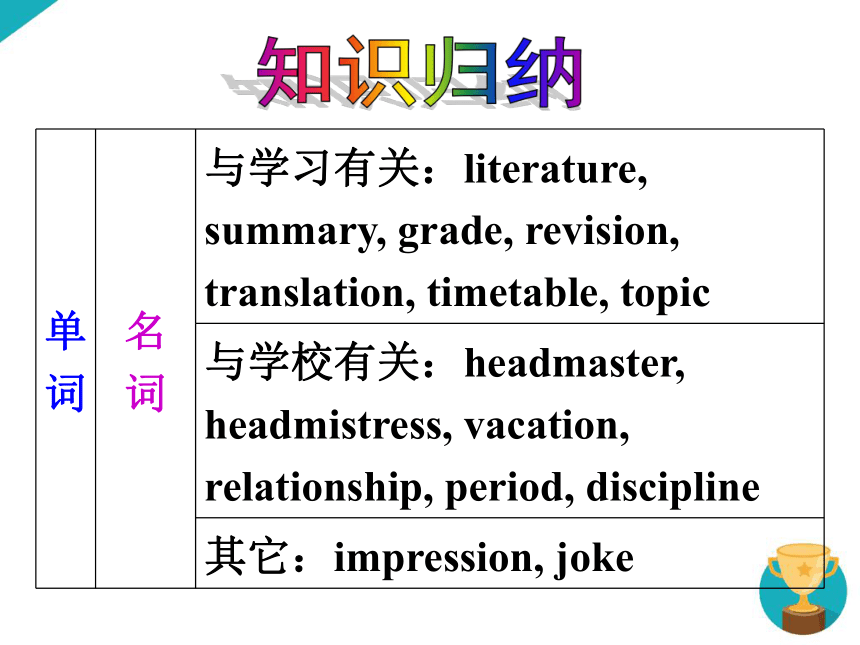
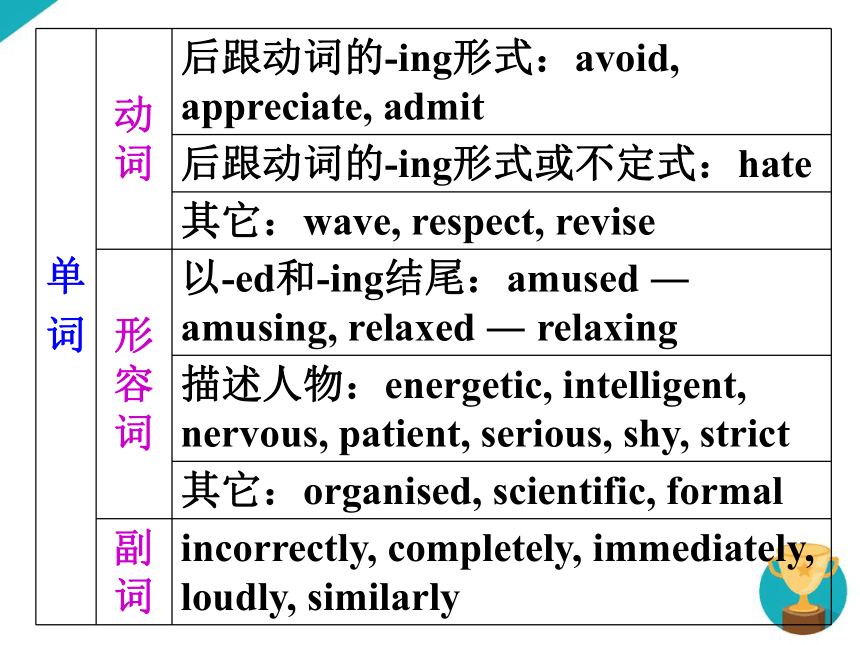
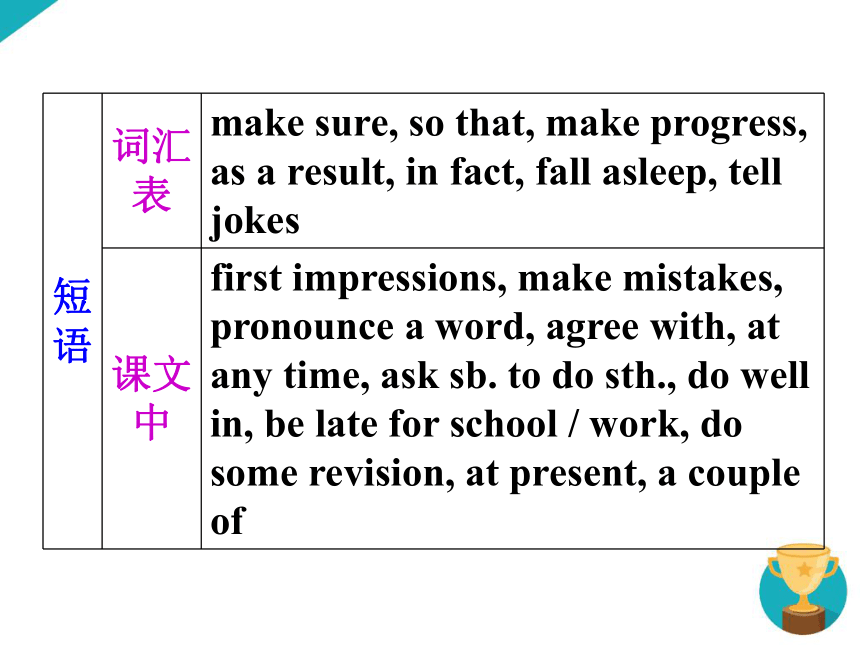

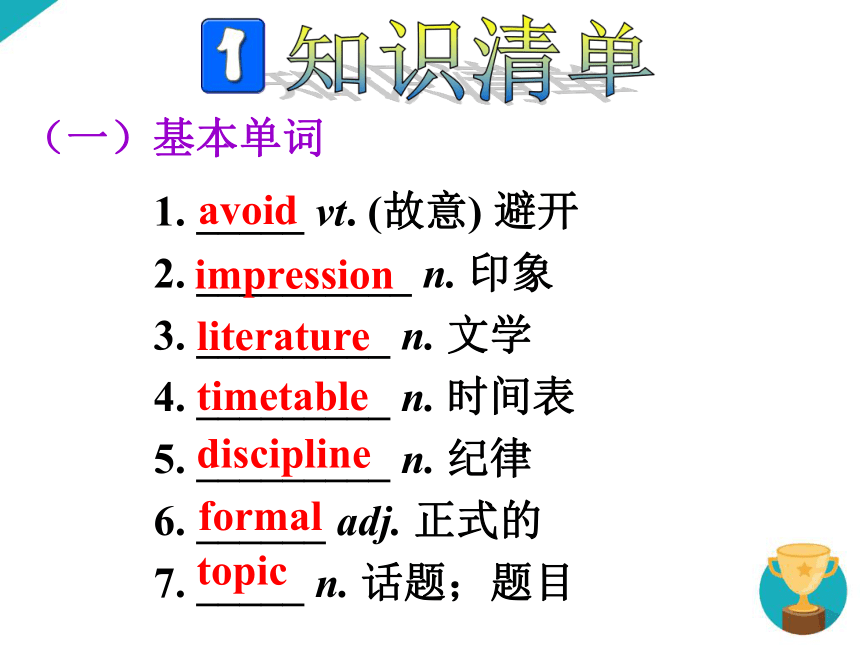
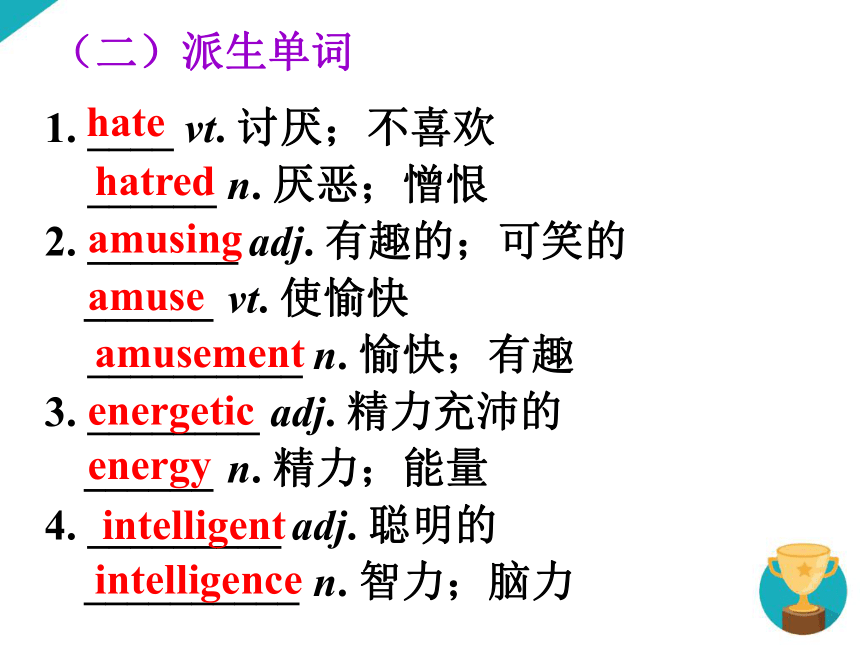
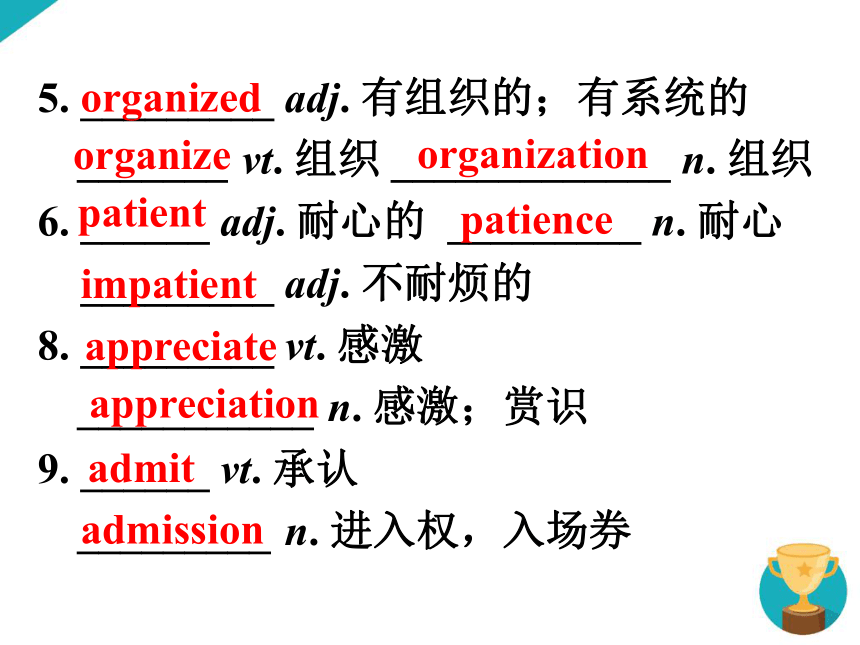
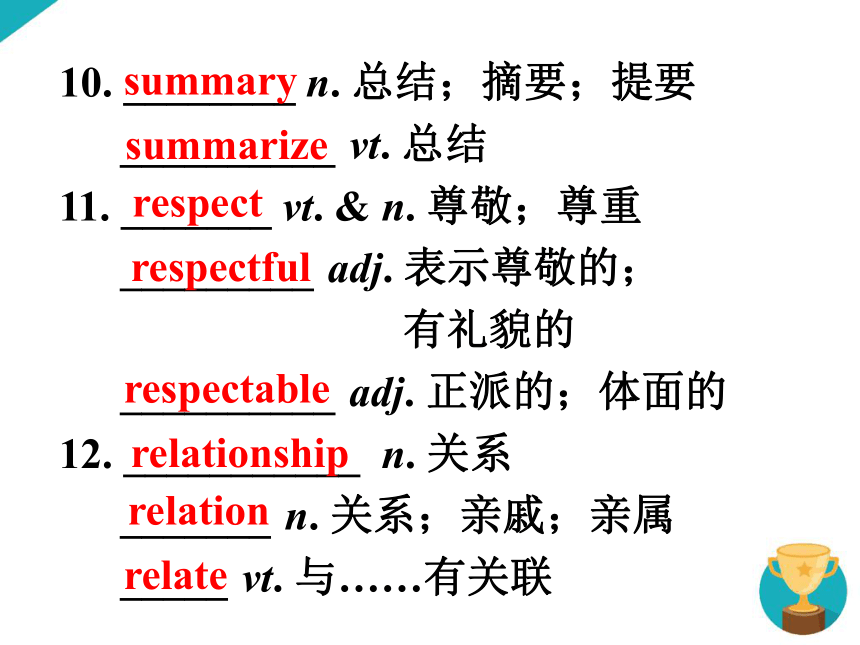
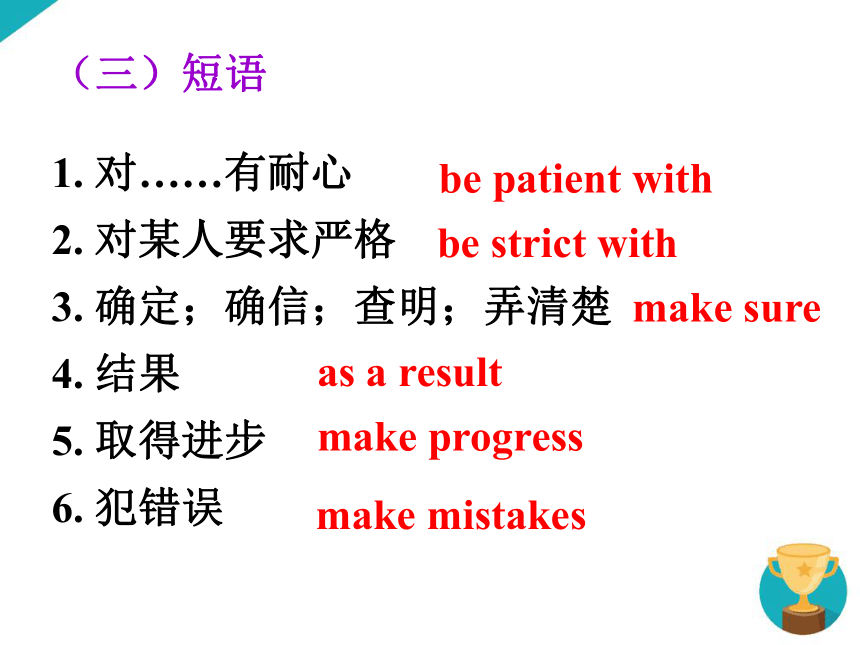
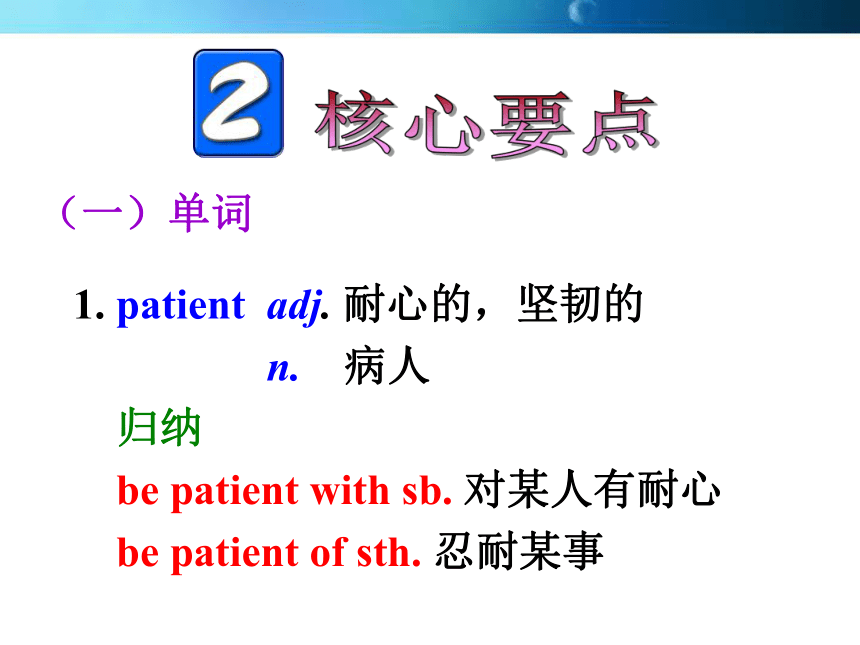

文档简介
课件71张PPT。Module 2
My New Teachers 知识归纳1. _____ vt. (故意) 避开
2. __________ n. 印象
3. _________ n. 文学
4. _________ n. 时间表
5. _________ n. 纪律
6. ______ adj. 正式的
7. _____ n. 话题;题目知识清单(一)基本单词avoidimpressionliteraturetimetabledisciplineformaltopic1. ____ vt. 讨厌;不喜欢
______ n. 厌恶;憎恨
2. _______ adj. 有趣的;可笑的
______ vt. 使愉快
__________ n. 愉快;有趣
3. ________ adj. 精力充沛的
______ n. 精力;能量
4. _________ adj. 聪明的
__________ n. 智力;脑力(二)派生单词hatehatredamusingamuseamusementenergeticenergyintelligentintelligence5. _________ adj. 有组织的;有系统的
_______ vt. 组织 _____________ n. 组织
6. ______ adj. 耐心的 _________ n. 耐心
_________ adj. 不耐烦的
8. _________ vt. 感激
___________ n. 感激;赏识
9. ______ vt. 承认
_________ n. 进入权,入场券organizedorganizeorganizationpatientpatienceimpatientappreciateappreciationadmitadmission10. ________ n. 总结;摘要;提要
__________ vt. 总结
11. _______ vt. & n. 尊敬;尊重
_________ adj. 表示尊敬的;
有礼貌的
__________ adj. 正派的;体面的
12. ___________ n. 关系
_______ n. 关系;亲戚;亲属
_____ vt. 与……有关联summarysummarizerespectrespectfulrespectablerelationshiprelationrelate1. 对……有耐心
2. 对某人要求严格
3. 确定;确信;查明;弄清楚
4. 结果
5. 取得进步
6. 犯错误(三)短语be patient withbe strict withmake sureas a resultmake progressmake mistakes1. patient adj. 耐心的,坚韧的
n. 病人
归纳
be patient with sb. 对某人有耐心
be patient of sth. 忍耐某事 核心要点(一)单词拓展
patience n. 耐心,耐性
impatient adj. 不耐烦的,没有耐心的
impatience n.不耐烦 have patience with sb./sth.
对某人/某事有耐心
have the patience to do sth. 有耐心做某事
out of patience with... 对……忍无可忍
have no patience with... 对……不能容忍
with patience=patiently (adv.) 耐心地2. avoid vt. 避免;避开;逃避
拓展
avoid后可跟名词、代词或动词的-ing形式作宾语。
avoid (doing) sth. 避免(做)某事。
avoidable adj.可避免的。
辨析:avoid, escape
avoid 指在做某事之前有意避开。
escape 指在做某事的过程中逃脱或逃
离,并且强调结果。【温馨提示】
常见直接跟动词-ing作宾语的词或词组口诀:
避免错过少延期 avoid, miss, delay/ put off
建议完成多练习 suggest/ recommend, finish,
practise
喜欢想像禁不住 enjoy, imagine, can’t help
承认否定还考虑 admit, deny, consider
逃避冒险不介意 escape, risk, mind
期待成功更值得 look forward to, succeed in,
be worth
还有excuse, resist, give up, can’t stand等。3. appreciate vt. 欣赏,重视;感激;
懂得
拓展
appreciate后接名词、代词或动名词作宾语。其后通常不直接接从句,而是以 it作先行宾语,其后再接从句。
I would appreciate it if…
如果……我将不胜感激appreciative? adj. 意为“感谢的,有欣赏能力的”,常与介词of连用。
appreciation? n. 意为“欣赏,理解,感谢,评价”。
翻译:
如果你读过书你会更欣赏电影。
You will appreciate the film better if you read the book. 如果你能帮助Jack学习功课,他将不胜感激。
Jack would much appreciate it if you could help him with his lessons.
我非常感谢你开车送我到机场。
I appreciate your driving me to the airport.
公司非常感谢我的努力。
The company was very appreciative of my efforts. 4. admit (admitted,admitting) vt. 承认
准许加入,允许进入
归纳
admit sth. 承认(事实、错误)
admit that… 承认
admit doing/ having done sth.
承认做过某事
admit sb. /sth. to be
承认某人/ 事(to be 作宾补)
admit to / into 允许进入…… 根据括号内的汉语提示补全下列句子。
1. It is said that the excellent boy
_________________________________
(已经被一所重点大学录取).
2. Tom refused to ____________________
__________ (承认打破了窗户).has been admitted to a key universitywindowadmit breaking the5. respect vt. & n. 尊敬,尊重
归纳
respect for sb./ sth. 因某事尊敬某人
respect oneself 自重,自尊
show/ have respect for 尊敬,尊重
send/ give one’s respects to...
代某人向……问好
in respect of sth. 关于某事物
in every respect=in all respects
在各个方面6. prefer v. 喜欢
归纳
prefer to do sth. 宁愿做某事
prefer sb. to do sth. 宁愿某人做某事
prefer doing sth. to (doing) sth.
宁愿做某事而不愿做某事
prefer to do sth. rather than do sth.
宁愿做……而不愿做…… 老人宁愿自己住也不愿意去国外和儿子一起住。
The old man preferred living alone to going abroad with his son.
她晚上宁愿呆家看看书。
She preferred to do some reading at home that evening.
比起坐公交我宁愿走路。
I prefer to walk rather than take a bus.1. make sure 查明;确保,确定
拓展
make sure of/ about sth./ doing sth.
make sure that…
be sure that… 确定
be sure to do sth. 主语肯定会做某事
be sure of doing sth.
主语对做某事有把握(二)短语2. as a result 作为结果,因此 (后跟结果)
拓展
as a result of 由于 (后跟原因)
with the result that... 结果……
without result 毫无结果
result in 导致 (后跟结果)
result from 起因,由于 (后跟原因)3. would rather 宁愿
拓展?
would rather do sth.
否定形式是 would rather not do sth.
后跟宾语从句时,从句谓语用虚拟语气,即谓语动词用过去式表示与现在或将来相反的愿望,用过去完成时表示与过去事实相反的愿望,引导从句的that常可省略。
would rather... than...? 宁愿……而不愿……你愿意走路还是坐公交?
Would you rather walk or take the bus?
我宁愿你告诉我事实。
I would rather you told me the truth.
我宁愿你那个晚上没有这么干。
I would rather (that) you hadn’t done that thing yesterday.1. Find yourself a part-time job if you are ________ (energy) enough, which will give you more working experience.
2. We will have to adopt a more ________ (science) approach in the future.
3. I don’t find that type of humor very ________ (amuse) at all.ExercisesⅠ. 用括号内所给单词的适当形式填空。energetic scientific amusing Ⅱ. 选用合适短语并用其适当形式填空。
1. It was foolish of Bruce to refer to his notes during the test, and _________, he got punished.
2. The lecture was so boring that some of the audience _________ halfway through it.make sure, make progress, as a result, ?as a result ? ?fell asleep 3. My friend Edwin wants to _________ that schools are committed to providing alternative education.
4. I am glad to see you have _____________ in your writing as well as in your pronunciation.make sure made progressmake sure, make progress, as a result, 1. She explains English grammar so clearly that even I can understand it!
她讲解英语语法如此清楚,甚至连我都能明白。
so... that与such... that
都引导结果状语从句,“如此……以至于……”。不同的是so为副词,such为形容词。其用法区别为: (三)句式 adj./ adv.
so + adj. + a/ an + n.单 + that…
many/ much/ few/ little + n. adj. + n.可数复数
such + a/ an + adj. + n.单 + that…
adj. + n.不可数 【温馨提示】
1. so与such引导的结果状语从句置于句首时,主句要部分倒装。
2. so that 所以,因此,结果 (引导结果状语从句);以便,为的是 (引导目的状语从句)。
so that引导目的状语从句,从句中常有can, may, could, might, will等情态动词,从句前不用逗号。
so that 引导结果状语从句一般不与情态动词连用,从句前可用逗号隔开。翻译:
他胖得无法通过这道门。
He was so fat that he couldn’t get through the door.
这个厨房很小,我不必太费劲就可以保持它的清洁。
It is such a tiny kitchen that I don't have to do much to keep it clean.他们日夜工作,以便可以提前完成任务。
They all worked day and night so that they might finish the task ahead of time.
那老人淋了雨,因此衣服全湿透了。
The old man was caught in a rain, so that all his clothes were wet.2. Physics will never be my favorite lesson, but I think that I’ll do well in the exam with Mrs Chen teaching me.
虽然物理永远不会是我最喜欢的课,但是我认为有陈老师教我,我会在考试中取得好成绩。
with+宾语+现在分词 (宾补) 结构,在句中作状语或定语。“with+宾语+宾补”结构主要有以下几种形式:1) with+宾语+adj.
e.g. 他喜欢开着窗子睡觉。
He likes sleeping _______________
_________.
2) with+宾语+副词
他睡觉的时候灯关了。
e.g. He fell asleep _______________. with the windowopenwith the light off3) with+宾语+现在分词 (表主动)
e.g. ______________________________
_________ , the teacher can’t go on
with his lessons.
这么多孩子又说又笑,老师不能继
续上课。
4) with+宾语+过去分词(表被动)
e.g. The boy went out to play _________
____________________.
作业没完成,男孩就出去玩了。With so many children talking andwith hishomework unfinishedlaughing5) with+宾语+不定式(侧重将来,侧重原因)
e.g. _____________________________
_____________, he was able to go to
work. 有护士照顾他生病的母亲,
他就能上班了。
6) with+宾语+介词短语
e.g. Miss Gao came into the classroom
________________________.
高老师手拿一本书进了教室。With a nurse to look after hiswith a book in her handsick mother3. We don’t dare to say a word unless she asks us to.
如果她不要求,我们连一句话也不敢说。
dare的用法
1) dare作情态动词主要用于否定句和疑问句中表示“敢”的意思。
2) dare作实义动词时,有时态和人称的变化,在否定句和疑问句中其后的不定式可 带to,也可不带to。3) 可用于某些习语中。I dare say是固定词组,意为“我想”,在句中作插入语或后面接从句;I dare to say. “我敢说”。
4) dare用作情态动词时,后接动词原形,此时dare和dared两种形式,没有人称和数的变化,主要用于否定句、疑问句或条件句。unless的用法
1) unless是从属连词,引导条件状语从句,含有否定意义,意为“如果不……就……”,“除非……要不然……”。
2) 在unless等引导的条件状语从句中,用一般时代替将来时,用现在完成时代替将来完成时。
3) 当从句的主语与主句的主语相同,并含有be动词时,从句的主语与be动词可一起省略。辨析:unless, not...until
unless引导从句时多强调条件,而not...until...句型则强调时间。unless连接的主从句的时态一般是主句为将来时而从句为现在时。not...until...连接的主从句中可以使用多种时态。翻译:
如果你上课不认真听老师讲课,考试将会不及格。
You will fail in the exam unless you listen to the teacher carefully in class.
直到鲍勃来,我们才开始。
We didn’t start until Bob came.4. This is true of France, Germany, and Spain, where discipline and respect for the teacher is considered very important.
这也同样存在于法国、德国和西班牙,在那里纪律与尊重老师被认为是很重要的。
This is true of... 和The same is true of... 是同样的句式,“……也是一样的”。【温馨提示】
This is true of / It’s the same with... / The same is true of... 与 so/ neither+助动词/ 情态动词/ 系动词+另一主语 在表示 “……也一样” 时的区别:前者多用于多个谓语或复杂的情况;后者多用于单个谓语的情况。交际用语: 5. It’s up to you. 这取决于你。 6. That’s settled. 就这么定了。接动词-ing形式作宾语的动词和短语
常见的后接动词-ing形式作宾语的动词及
短语可用下面的顺口溜来记忆。
喜欢 否认和避免 (enjoy, deny, escape / avoid)
错过 放弃太冒险 (miss, give up, risk)
承认 欣赏很值得 (admit, appreciate, be worth)语法反对 想象莫推延 (be opposed to, imagine / fancy, delay / put off / postpone)
要求 完成是期望 (require, finish, look forward to)
建议 继续勤练习 (suggest, keep / keep on, practise)
习惯 考虑要坚持 (get used to, consider, insist on / stick to)允许 介意便成功 (allow / permit, mind, succeed in)
包括 抵抗和厌恶 (include, resist, dislike)
后接动词-ing形式作宾语的短语还有can’t help, feel like, have difficulty / trouble (in), have a good time (in)等。 【难点提示】
?????? 一些动词或短语后面既可以接动词-ing形式作宾语也可以接不定式作宾语。
1. 动词begin, start, continue等后接以上两种形式作宾语时意义上没有什么区别。如:
Alan started building / to build his own lab when he was only 14.
Emma continued working / to work after she had her baby.2. 有些动词后接以上两种形式作宾语时意义有明显的区别。
remember / forget to do sth. 记住/忘记要做某事
remember / forget doing sth. 记得/忘记做过某事
regret to do sth. 遗憾地要做某事????????
regret doing sth. 后悔做过某事
stop to do sth. 停下(原来的事)去做另一件事
stop doing sth. 停止做某事try to do sth. 努力做某事?????????????????
try doing sth. 尝试着做某事
mean to do sth. 打算做某事???????????????
mean doing sth. 意味着做某事
need to do sth. 需要去做某事?????????????
need doing? 某事需要被做
go on to do sth.(做完某事)接着做另一件事
go on doing sth. 继续做同一件事3. hate, like, love, prefer等表示情绪的动词后接动词-ing形式常表示经常性的行为,接不定式常表示具体的一次行为。
e.g. I hate driving alone on a long
journey.
Gary hates to tell his mother the
truth.用括号内单词的正确形式填空。
1. —Remember ________ (return) the book
to me after you read it.
—No problem.
2.?The young girl practices ________ (play) the violin every day.
3. We were lucky to escape ________ (hit) by the car.
4. Mary always keeps ________ (put) off seeing the dentist.to return?playing?being hit?putting5. My job doesn’t include ________ (make) coffee for the boss.
6. Can you imagine what difficulty we had ________ (reach) home in the storm?
7. Sorry, we don’t allow ________ (smoke) here.
8. All our classmates are considering ________ (go) to the city centre for the fashion show.making?reaching?smokinggoing 如何描写你的老师
【写作任务】
假设你是李华。最近,你的英国笔友珍妮(Jenny)来信询问你的英语老师的情况。请你给她写一封回信,内容包括老师的外貌、性格、教学特色以及你对老师的评价。
注意:
1. 词数120左右(开头语已给出,但不计入总词数);
2. 可适当增加细节,以使行文连贯。写作Dear Jenny,
Thank you for your letter. I am writing to tell you something about my English teacher.???
__________________________________________________________________________
__________________________________________________________________________
All the best,
Li Hua【写作指导】
1. 审题定调
本文以写人为主。
时态:描写外貌、性格、教学特色和作评价时常用现在时;讲述事件常用过去时。
人称:第三人称为主。
2. 确定主体内容
文章主要包括四个方面:老师的外貌、性格、教学特色和对老师的评价。3. 审定篇章结构
全文可分三部分:
第一部分:引出话题;
第二部分:介绍老师的外貌、性格及教学特色;
第三部分:对老师的总体评价。
4. 常用表达
词汇
外貌特征:pretty, handsome, fat, thin, tall, short, dark-skinned, healthy, strong, young, fashionable, cool ...性格特点:friendly, energetic, patient, kind, kind-hearted, warm-hearted, hard-working, confident ...
教学特色:lively, humorous, enthusiastic, strict, clearly ...
评价:love, respect, think highly of ...
句式
... is so ... that ...?
... is considered as ...
... is one of the greatest teachers.
We find her / his class ...?
Thanks to ..., I ...【范文欣赏】
Dear Jenny,
Thank you for your letter. I am writing to tell you something about my English teacher. I have had many English teachers, but Miss Li, my present English teacher, is my favourite.
Miss Li is tall and thin. It is said that she is in her late forties, but she looks very young. She is always so kind to us students that she is just like our mother. She has different ways of teaching in class, so we find her class lively and interesting. She always encourages us to speak English in class and never be afraid of making mistakes. Thanks to her excellent teaching, I have made rapid? progress in my English.
Miss Li is such a good teacher that we all respect her very much. In fact, she is considered as one of the most popular teachers in my school.?
All the best,
Li Hua巩固练习用括号内动词的正确形式填空。
1. Under?the?circumstances,it was impossible to avoid _____________ (affect).
2. Bill suggested ________ (bring) the meeting to an end, because it was too late.
3. I was so angry that I felt like ________ (throw) something at him.being affected? ??bringing?throwing4. Anna enjoyed ________ (take) her sister for walks through the country park.
5. You had better give up ________ (wear) your new suit to work or it will soon look as old as all your other clothes.
6. Lydia had kept him ________ (wait) twenty minutes on this occasion.taking?wearing ?waiting阅读材料,在空白处填入适当的内容(不多于3个单词)或括号内单词的正确形式。
What makes a good teacher? Many of us have fond memories of our favourite teacher 1. ________ we were at school. I suppose we also have not such fond memories of our least favourite teacher, as well. when? ???Ask people 2. ______ their favourite teacher was like and they’ll probably say something like he or she was kind and patient 3. ______ shy children and never made the students nervous.
They might even say that he or she was good at 4. ________ (tell) jokes and made everybody laugh. Their least favourite teacher, of course, wasn’t like that 5. _____ all. what ?with? telling?at? ?????He or she was too strict and only 6. _________ (interest) in discipline. 7. ____ a result, they couldn’t make any real progess in his or her class.
But 8. _________ (personal), if you ask me what makes a good teacher, I would say 9. ____ good book. Good books are teachers that come in many shapes and sizes and can continue to teach you for 10. ____ of your life.? interested? As?personallya? ??all1. There was an uncovered well on the road
and the man couldn’t ________ falling
into it in the darkness.
A.avoid B.help
C.refuse D.prevent
解析:avoid doing sth. “避免/避开做某事”;can’t help doing “禁不住做某事”;refuse后跟动词不定式 to do作宾语,“拒绝做某事”;prevent... from doing sth. “阻止……做……”。单项选择。2. China will at the forefront of combating
climate change by 2020 if it ____
government targets on reducing greenhouse
gas emissions (排放物).
A.admits B.meets
C.deserves D.recognizes
解析:如果中国能达到有关削减温室气体排放的政府目标,到2020年中国将跻身于对抗气候变化的前沿。meet “符合,达到”。admit “承认,接纳”;deserve “值得,应受”;recognize “认出”。3. This morning, he went to school in _____ a
hurry that he wore shoes that didn’t _____
at all.
A. so; suit B. such; fit
C. such; match D. so; go with
解析:such+n.+that及so+adj./adv.+that句型和suit match, fit, go with 用法。match“匹配”;fit侧重指“尺寸大小合适”;suit侧重“合乎条件、身份、口味等”;go with“同意;接受;与某物相配”。
My New Teachers 知识归纳1. _____ vt. (故意) 避开
2. __________ n. 印象
3. _________ n. 文学
4. _________ n. 时间表
5. _________ n. 纪律
6. ______ adj. 正式的
7. _____ n. 话题;题目知识清单(一)基本单词avoidimpressionliteraturetimetabledisciplineformaltopic1. ____ vt. 讨厌;不喜欢
______ n. 厌恶;憎恨
2. _______ adj. 有趣的;可笑的
______ vt. 使愉快
__________ n. 愉快;有趣
3. ________ adj. 精力充沛的
______ n. 精力;能量
4. _________ adj. 聪明的
__________ n. 智力;脑力(二)派生单词hatehatredamusingamuseamusementenergeticenergyintelligentintelligence5. _________ adj. 有组织的;有系统的
_______ vt. 组织 _____________ n. 组织
6. ______ adj. 耐心的 _________ n. 耐心
_________ adj. 不耐烦的
8. _________ vt. 感激
___________ n. 感激;赏识
9. ______ vt. 承认
_________ n. 进入权,入场券organizedorganizeorganizationpatientpatienceimpatientappreciateappreciationadmitadmission10. ________ n. 总结;摘要;提要
__________ vt. 总结
11. _______ vt. & n. 尊敬;尊重
_________ adj. 表示尊敬的;
有礼貌的
__________ adj. 正派的;体面的
12. ___________ n. 关系
_______ n. 关系;亲戚;亲属
_____ vt. 与……有关联summarysummarizerespectrespectfulrespectablerelationshiprelationrelate1. 对……有耐心
2. 对某人要求严格
3. 确定;确信;查明;弄清楚
4. 结果
5. 取得进步
6. 犯错误(三)短语be patient withbe strict withmake sureas a resultmake progressmake mistakes1. patient adj. 耐心的,坚韧的
n. 病人
归纳
be patient with sb. 对某人有耐心
be patient of sth. 忍耐某事 核心要点(一)单词拓展
patience n. 耐心,耐性
impatient adj. 不耐烦的,没有耐心的
impatience n.不耐烦 have patience with sb./sth.
对某人/某事有耐心
have the patience to do sth. 有耐心做某事
out of patience with... 对……忍无可忍
have no patience with... 对……不能容忍
with patience=patiently (adv.) 耐心地2. avoid vt. 避免;避开;逃避
拓展
avoid后可跟名词、代词或动词的-ing形式作宾语。
avoid (doing) sth. 避免(做)某事。
avoidable adj.可避免的。
辨析:avoid, escape
avoid 指在做某事之前有意避开。
escape 指在做某事的过程中逃脱或逃
离,并且强调结果。【温馨提示】
常见直接跟动词-ing作宾语的词或词组口诀:
避免错过少延期 avoid, miss, delay/ put off
建议完成多练习 suggest/ recommend, finish,
practise
喜欢想像禁不住 enjoy, imagine, can’t help
承认否定还考虑 admit, deny, consider
逃避冒险不介意 escape, risk, mind
期待成功更值得 look forward to, succeed in,
be worth
还有excuse, resist, give up, can’t stand等。3. appreciate vt. 欣赏,重视;感激;
懂得
拓展
appreciate后接名词、代词或动名词作宾语。其后通常不直接接从句,而是以 it作先行宾语,其后再接从句。
I would appreciate it if…
如果……我将不胜感激appreciative? adj. 意为“感谢的,有欣赏能力的”,常与介词of连用。
appreciation? n. 意为“欣赏,理解,感谢,评价”。
翻译:
如果你读过书你会更欣赏电影。
You will appreciate the film better if you read the book. 如果你能帮助Jack学习功课,他将不胜感激。
Jack would much appreciate it if you could help him with his lessons.
我非常感谢你开车送我到机场。
I appreciate your driving me to the airport.
公司非常感谢我的努力。
The company was very appreciative of my efforts. 4. admit (admitted,admitting) vt. 承认
准许加入,允许进入
归纳
admit sth. 承认(事实、错误)
admit that… 承认
admit doing/ having done sth.
承认做过某事
admit sb. /sth. to be
承认某人/ 事(to be 作宾补)
admit to / into 允许进入…… 根据括号内的汉语提示补全下列句子。
1. It is said that the excellent boy
_________________________________
(已经被一所重点大学录取).
2. Tom refused to ____________________
__________ (承认打破了窗户).has been admitted to a key universitywindowadmit breaking the5. respect vt. & n. 尊敬,尊重
归纳
respect for sb./ sth. 因某事尊敬某人
respect oneself 自重,自尊
show/ have respect for 尊敬,尊重
send/ give one’s respects to...
代某人向……问好
in respect of sth. 关于某事物
in every respect=in all respects
在各个方面6. prefer v. 喜欢
归纳
prefer to do sth. 宁愿做某事
prefer sb. to do sth. 宁愿某人做某事
prefer doing sth. to (doing) sth.
宁愿做某事而不愿做某事
prefer to do sth. rather than do sth.
宁愿做……而不愿做…… 老人宁愿自己住也不愿意去国外和儿子一起住。
The old man preferred living alone to going abroad with his son.
她晚上宁愿呆家看看书。
She preferred to do some reading at home that evening.
比起坐公交我宁愿走路。
I prefer to walk rather than take a bus.1. make sure 查明;确保,确定
拓展
make sure of/ about sth./ doing sth.
make sure that…
be sure that… 确定
be sure to do sth. 主语肯定会做某事
be sure of doing sth.
主语对做某事有把握(二)短语2. as a result 作为结果,因此 (后跟结果)
拓展
as a result of 由于 (后跟原因)
with the result that... 结果……
without result 毫无结果
result in 导致 (后跟结果)
result from 起因,由于 (后跟原因)3. would rather 宁愿
拓展?
would rather do sth.
否定形式是 would rather not do sth.
后跟宾语从句时,从句谓语用虚拟语气,即谓语动词用过去式表示与现在或将来相反的愿望,用过去完成时表示与过去事实相反的愿望,引导从句的that常可省略。
would rather... than...? 宁愿……而不愿……你愿意走路还是坐公交?
Would you rather walk or take the bus?
我宁愿你告诉我事实。
I would rather you told me the truth.
我宁愿你那个晚上没有这么干。
I would rather (that) you hadn’t done that thing yesterday.1. Find yourself a part-time job if you are ________ (energy) enough, which will give you more working experience.
2. We will have to adopt a more ________ (science) approach in the future.
3. I don’t find that type of humor very ________ (amuse) at all.ExercisesⅠ. 用括号内所给单词的适当形式填空。energetic scientific amusing Ⅱ. 选用合适短语并用其适当形式填空。
1. It was foolish of Bruce to refer to his notes during the test, and _________, he got punished.
2. The lecture was so boring that some of the audience _________ halfway through it.make sure, make progress, as a result, ?as a result ? ?fell asleep 3. My friend Edwin wants to _________ that schools are committed to providing alternative education.
4. I am glad to see you have _____________ in your writing as well as in your pronunciation.make sure made progressmake sure, make progress, as a result, 1. She explains English grammar so clearly that even I can understand it!
她讲解英语语法如此清楚,甚至连我都能明白。
so... that与such... that
都引导结果状语从句,“如此……以至于……”。不同的是so为副词,such为形容词。其用法区别为: (三)句式 adj./ adv.
so + adj. + a/ an + n.单 + that…
many/ much/ few/ little + n. adj. + n.可数复数
such + a/ an + adj. + n.单 + that…
adj. + n.不可数 【温馨提示】
1. so与such引导的结果状语从句置于句首时,主句要部分倒装。
2. so that 所以,因此,结果 (引导结果状语从句);以便,为的是 (引导目的状语从句)。
so that引导目的状语从句,从句中常有can, may, could, might, will等情态动词,从句前不用逗号。
so that 引导结果状语从句一般不与情态动词连用,从句前可用逗号隔开。翻译:
他胖得无法通过这道门。
He was so fat that he couldn’t get through the door.
这个厨房很小,我不必太费劲就可以保持它的清洁。
It is such a tiny kitchen that I don't have to do much to keep it clean.他们日夜工作,以便可以提前完成任务。
They all worked day and night so that they might finish the task ahead of time.
那老人淋了雨,因此衣服全湿透了。
The old man was caught in a rain, so that all his clothes were wet.2. Physics will never be my favorite lesson, but I think that I’ll do well in the exam with Mrs Chen teaching me.
虽然物理永远不会是我最喜欢的课,但是我认为有陈老师教我,我会在考试中取得好成绩。
with+宾语+现在分词 (宾补) 结构,在句中作状语或定语。“with+宾语+宾补”结构主要有以下几种形式:1) with+宾语+adj.
e.g. 他喜欢开着窗子睡觉。
He likes sleeping _______________
_________.
2) with+宾语+副词
他睡觉的时候灯关了。
e.g. He fell asleep _______________. with the windowopenwith the light off3) with+宾语+现在分词 (表主动)
e.g. ______________________________
_________ , the teacher can’t go on
with his lessons.
这么多孩子又说又笑,老师不能继
续上课。
4) with+宾语+过去分词(表被动)
e.g. The boy went out to play _________
____________________.
作业没完成,男孩就出去玩了。With so many children talking andwith hishomework unfinishedlaughing5) with+宾语+不定式(侧重将来,侧重原因)
e.g. _____________________________
_____________, he was able to go to
work. 有护士照顾他生病的母亲,
他就能上班了。
6) with+宾语+介词短语
e.g. Miss Gao came into the classroom
________________________.
高老师手拿一本书进了教室。With a nurse to look after hiswith a book in her handsick mother3. We don’t dare to say a word unless she asks us to.
如果她不要求,我们连一句话也不敢说。
dare的用法
1) dare作情态动词主要用于否定句和疑问句中表示“敢”的意思。
2) dare作实义动词时,有时态和人称的变化,在否定句和疑问句中其后的不定式可 带to,也可不带to。3) 可用于某些习语中。I dare say是固定词组,意为“我想”,在句中作插入语或后面接从句;I dare to say. “我敢说”。
4) dare用作情态动词时,后接动词原形,此时dare和dared两种形式,没有人称和数的变化,主要用于否定句、疑问句或条件句。unless的用法
1) unless是从属连词,引导条件状语从句,含有否定意义,意为“如果不……就……”,“除非……要不然……”。
2) 在unless等引导的条件状语从句中,用一般时代替将来时,用现在完成时代替将来完成时。
3) 当从句的主语与主句的主语相同,并含有be动词时,从句的主语与be动词可一起省略。辨析:unless, not...until
unless引导从句时多强调条件,而not...until...句型则强调时间。unless连接的主从句的时态一般是主句为将来时而从句为现在时。not...until...连接的主从句中可以使用多种时态。翻译:
如果你上课不认真听老师讲课,考试将会不及格。
You will fail in the exam unless you listen to the teacher carefully in class.
直到鲍勃来,我们才开始。
We didn’t start until Bob came.4. This is true of France, Germany, and Spain, where discipline and respect for the teacher is considered very important.
这也同样存在于法国、德国和西班牙,在那里纪律与尊重老师被认为是很重要的。
This is true of... 和The same is true of... 是同样的句式,“……也是一样的”。【温馨提示】
This is true of / It’s the same with... / The same is true of... 与 so/ neither+助动词/ 情态动词/ 系动词+另一主语 在表示 “……也一样” 时的区别:前者多用于多个谓语或复杂的情况;后者多用于单个谓语的情况。交际用语: 5. It’s up to you. 这取决于你。 6. That’s settled. 就这么定了。接动词-ing形式作宾语的动词和短语
常见的后接动词-ing形式作宾语的动词及
短语可用下面的顺口溜来记忆。
喜欢 否认和避免 (enjoy, deny, escape / avoid)
错过 放弃太冒险 (miss, give up, risk)
承认 欣赏很值得 (admit, appreciate, be worth)语法反对 想象莫推延 (be opposed to, imagine / fancy, delay / put off / postpone)
要求 完成是期望 (require, finish, look forward to)
建议 继续勤练习 (suggest, keep / keep on, practise)
习惯 考虑要坚持 (get used to, consider, insist on / stick to)允许 介意便成功 (allow / permit, mind, succeed in)
包括 抵抗和厌恶 (include, resist, dislike)
后接动词-ing形式作宾语的短语还有can’t help, feel like, have difficulty / trouble (in), have a good time (in)等。 【难点提示】
?????? 一些动词或短语后面既可以接动词-ing形式作宾语也可以接不定式作宾语。
1. 动词begin, start, continue等后接以上两种形式作宾语时意义上没有什么区别。如:
Alan started building / to build his own lab when he was only 14.
Emma continued working / to work after she had her baby.2. 有些动词后接以上两种形式作宾语时意义有明显的区别。
remember / forget to do sth. 记住/忘记要做某事
remember / forget doing sth. 记得/忘记做过某事
regret to do sth. 遗憾地要做某事????????
regret doing sth. 后悔做过某事
stop to do sth. 停下(原来的事)去做另一件事
stop doing sth. 停止做某事try to do sth. 努力做某事?????????????????
try doing sth. 尝试着做某事
mean to do sth. 打算做某事???????????????
mean doing sth. 意味着做某事
need to do sth. 需要去做某事?????????????
need doing? 某事需要被做
go on to do sth.(做完某事)接着做另一件事
go on doing sth. 继续做同一件事3. hate, like, love, prefer等表示情绪的动词后接动词-ing形式常表示经常性的行为,接不定式常表示具体的一次行为。
e.g. I hate driving alone on a long
journey.
Gary hates to tell his mother the
truth.用括号内单词的正确形式填空。
1. —Remember ________ (return) the book
to me after you read it.
—No problem.
2.?The young girl practices ________ (play) the violin every day.
3. We were lucky to escape ________ (hit) by the car.
4. Mary always keeps ________ (put) off seeing the dentist.to return?playing?being hit?putting5. My job doesn’t include ________ (make) coffee for the boss.
6. Can you imagine what difficulty we had ________ (reach) home in the storm?
7. Sorry, we don’t allow ________ (smoke) here.
8. All our classmates are considering ________ (go) to the city centre for the fashion show.making?reaching?smokinggoing 如何描写你的老师
【写作任务】
假设你是李华。最近,你的英国笔友珍妮(Jenny)来信询问你的英语老师的情况。请你给她写一封回信,内容包括老师的外貌、性格、教学特色以及你对老师的评价。
注意:
1. 词数120左右(开头语已给出,但不计入总词数);
2. 可适当增加细节,以使行文连贯。写作Dear Jenny,
Thank you for your letter. I am writing to tell you something about my English teacher.???
__________________________________________________________________________
__________________________________________________________________________
All the best,
Li Hua【写作指导】
1. 审题定调
本文以写人为主。
时态:描写外貌、性格、教学特色和作评价时常用现在时;讲述事件常用过去时。
人称:第三人称为主。
2. 确定主体内容
文章主要包括四个方面:老师的外貌、性格、教学特色和对老师的评价。3. 审定篇章结构
全文可分三部分:
第一部分:引出话题;
第二部分:介绍老师的外貌、性格及教学特色;
第三部分:对老师的总体评价。
4. 常用表达
词汇
外貌特征:pretty, handsome, fat, thin, tall, short, dark-skinned, healthy, strong, young, fashionable, cool ...性格特点:friendly, energetic, patient, kind, kind-hearted, warm-hearted, hard-working, confident ...
教学特色:lively, humorous, enthusiastic, strict, clearly ...
评价:love, respect, think highly of ...
句式
... is so ... that ...?
... is considered as ...
... is one of the greatest teachers.
We find her / his class ...?
Thanks to ..., I ...【范文欣赏】
Dear Jenny,
Thank you for your letter. I am writing to tell you something about my English teacher. I have had many English teachers, but Miss Li, my present English teacher, is my favourite.
Miss Li is tall and thin. It is said that she is in her late forties, but she looks very young. She is always so kind to us students that she is just like our mother. She has different ways of teaching in class, so we find her class lively and interesting. She always encourages us to speak English in class and never be afraid of making mistakes. Thanks to her excellent teaching, I have made rapid? progress in my English.
Miss Li is such a good teacher that we all respect her very much. In fact, she is considered as one of the most popular teachers in my school.?
All the best,
Li Hua巩固练习用括号内动词的正确形式填空。
1. Under?the?circumstances,it was impossible to avoid _____________ (affect).
2. Bill suggested ________ (bring) the meeting to an end, because it was too late.
3. I was so angry that I felt like ________ (throw) something at him.being affected? ??bringing?throwing4. Anna enjoyed ________ (take) her sister for walks through the country park.
5. You had better give up ________ (wear) your new suit to work or it will soon look as old as all your other clothes.
6. Lydia had kept him ________ (wait) twenty minutes on this occasion.taking?wearing ?waiting阅读材料,在空白处填入适当的内容(不多于3个单词)或括号内单词的正确形式。
What makes a good teacher? Many of us have fond memories of our favourite teacher 1. ________ we were at school. I suppose we also have not such fond memories of our least favourite teacher, as well. when? ???Ask people 2. ______ their favourite teacher was like and they’ll probably say something like he or she was kind and patient 3. ______ shy children and never made the students nervous.
They might even say that he or she was good at 4. ________ (tell) jokes and made everybody laugh. Their least favourite teacher, of course, wasn’t like that 5. _____ all. what ?with? telling?at? ?????He or she was too strict and only 6. _________ (interest) in discipline. 7. ____ a result, they couldn’t make any real progess in his or her class.
But 8. _________ (personal), if you ask me what makes a good teacher, I would say 9. ____ good book. Good books are teachers that come in many shapes and sizes and can continue to teach you for 10. ____ of your life.? interested? As?personallya? ??all1. There was an uncovered well on the road
and the man couldn’t ________ falling
into it in the darkness.
A.avoid B.help
C.refuse D.prevent
解析:avoid doing sth. “避免/避开做某事”;can’t help doing “禁不住做某事”;refuse后跟动词不定式 to do作宾语,“拒绝做某事”;prevent... from doing sth. “阻止……做……”。单项选择。2. China will at the forefront of combating
climate change by 2020 if it ____
government targets on reducing greenhouse
gas emissions (排放物).
A.admits B.meets
C.deserves D.recognizes
解析:如果中国能达到有关削减温室气体排放的政府目标,到2020年中国将跻身于对抗气候变化的前沿。meet “符合,达到”。admit “承认,接纳”;deserve “值得,应受”;recognize “认出”。3. This morning, he went to school in _____ a
hurry that he wore shoes that didn’t _____
at all.
A. so; suit B. such; fit
C. such; match D. so; go with
解析:such+n.+that及so+adj./adv.+that句型和suit match, fit, go with 用法。match“匹配”;fit侧重指“尺寸大小合适”;suit侧重“合乎条件、身份、口味等”;go with“同意;接受;与某物相配”。
